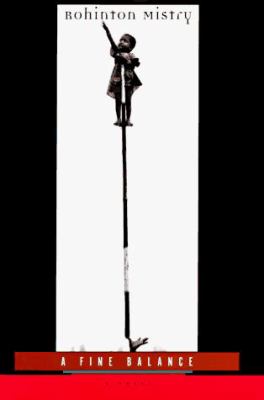
by Rohinton Mistry
Library Journal: In mid-1970s urban India-a chaos of wretchedness on the streets and slogans in the offices-a chain of circumstances tosses four varied individuals together in one small flat. Stubbornly independent Dina, widowed early, takes in Maneck, the college-aged son of a more prosperous childhood friend and, more reluctantly, Ishvar and Om, uncle and nephew tailors fleeing low-caste origins and astonishing hardships. The reader first learns the characters' separate, compelling histories of brief joys and abiding sorrows, then watches as barriers of class, suspicion, and politeness are gradually dissolved. Even more affecting than Mistry's depictions of squalor and grotesque injustice is his study of friendships emerging unexpectedly, naturally. The novel's coda is cruel and heart-wrenching but deeply honest. This unforgettable book from the author of Such a Long Journey (LJ 4/15/91) is highly recommended.-Janet Ingraham, Worthington P.L., Ohio Copyright 1996 Cahners Business Information, Inc. Distributed by Syndetic Solutions Inc. Terms
Publisher's Weekly: The setting of Mistry's quietly magnificent second novel (after the acclaimed Such a Long Journey) is India in 1975-76, when Prime Minister Indira Gandhi, defying a court order calling for her resignation, declares a state of emergency and imprisons the parliamentary opposition as well as thousands of students, teachers, trade unionists and journalists. These events, along with the government's forced sterilization campaign, serve as backdrop for an intricate tale of four ordinary people struggling to survive. Naive college student Maneck Kohlah, whose parents' general store is failing, rents a room in the house of Dina Dalal, a 40-ish widowed seamstress. Dina acquires two additional boarders: hapless but enterprising itinerant tailor Ishvar Darji and his nephew Omprakash, whose father, a village untouchable, was murdered as punishment for crossing caste boundaries. With great empathy and wit, the Bombay-born, Toronto-based Mistry evokes the daily heroism of India's working poor, who must cope with corruption, social anarchy and bureaucratic absurdities. Though the sprawling, chatty narrative risks becoming as unwieldy as the lives it so vibrantly depicts, Mistry combines an openness to India's infinite sensory detail with a Dickensian rendering of the effects of poverty, caste, envy, superstition,corruption and bigotry. His vast, wonderfully precise canvas poses, but cannot answer, the riddle of how to transform a corrupt, ailing society into a healthy one. Copyright 1996 Cahners Business Information, Inc. Distributed by Syndetic Solutions Inc. Terms
CHOICE: A worthy successor to Mistry's award-winning Such a Long Journey , this wonderful, baggy, Dickensian narrative follows the fortunes of an independent widow, a college student, and two impoverished tailors who share a crowded apartment. The novel includes a large cast of memorable characters, whose stories range from brutal caste struggles in small villages to homelessness in flimsy shacks surrounding the sprawling city teeming with pavement dwellers, beggars, rent collectors, con men, and corrupt police. The novel's world is often cruel and unfeeling, but the characters struggle on, trying to achieve lives of dignity and meaning. Valmik (proofreader and sometime flack for a bogus guru) provides the novel's title: "The secret of life was to balance hope and despair." The Vishram Vegetarian Hotel cook tells the tailors, "You fellows are amazing.... Each time you come here you have a new adventure story." "It's not us; it's this city," replies the tailor, "a story factory, that's what it is, a spinning mill." Mistry's humorous and compassionate tangle of tales and characters is a story factory, too. And we listen spellbound to a master story spinner at work. Distributed by Syndetic Solutions Inc. Terms
|